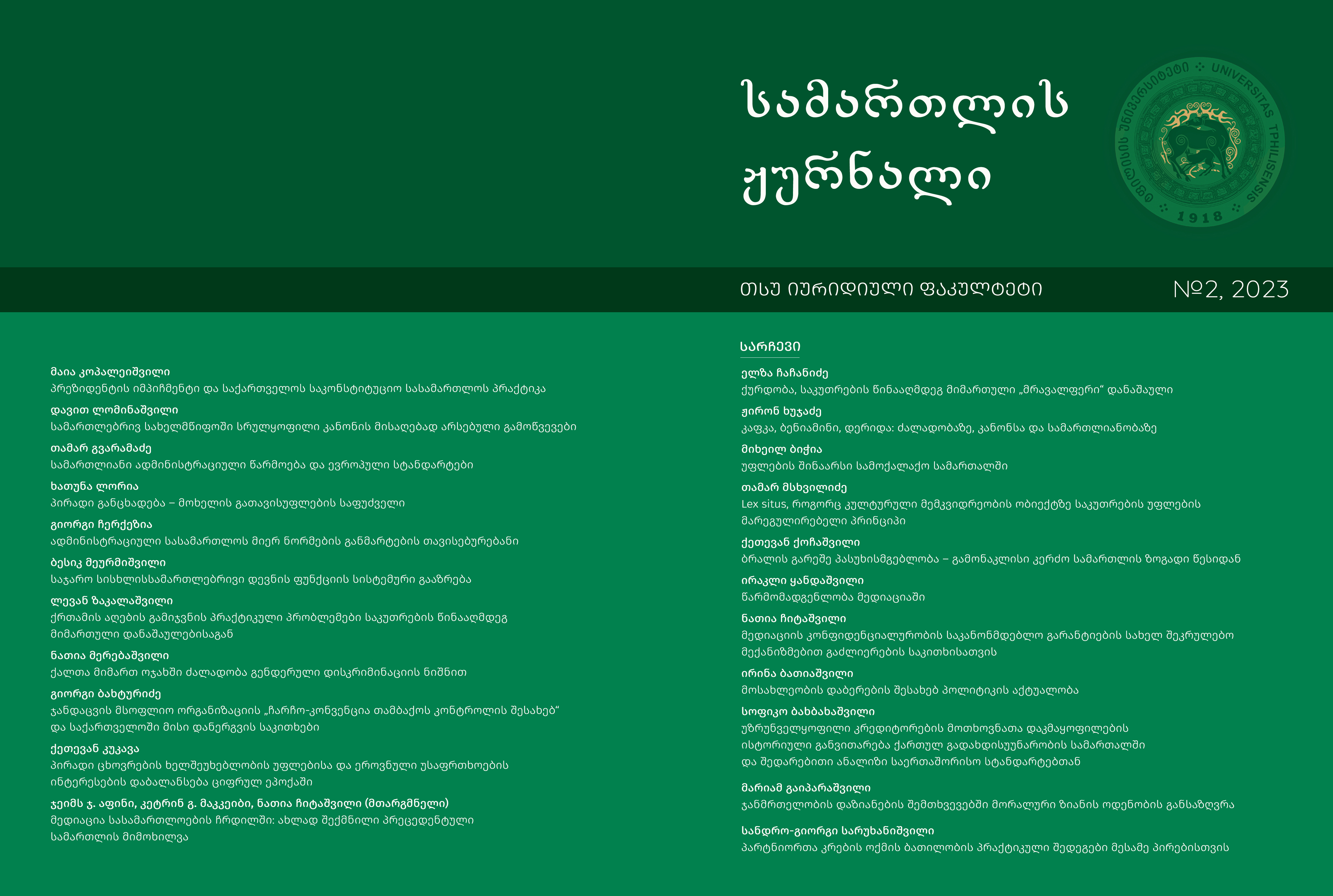უზრუნველყოფილი კრედიტორების მოთხოვნათა დაკმაყოფილების ისტორიული განვითარება ქართულ გადახდისუუნარობის სამართალში და შედარებითი ანალიზი საერთაშორისო სტანდარტებთან
DOI:
https://doi.org/10.60131/jlaw.2.2023.7699საკვანძო სიტყვები:
უზრუნველყოფილი კრედიტორების მოთხოვნების დაკმაყოფილება, ისტორიული ექსკურსი, საერთაშორისო სტანდარტები, შედარებითი ანალიზი, უზრუნველყოფილი უფლებების უპირატესობანი.ანოტაცია
უზრუნველყოფილი კრედიტორები გადამწყვეტ როლს თამაშობენ ბიზნეს სექტორის განვითარებაში, ვინაიდან ისინი მნიშვნელოვანი საბაზრო ძალაუფლების მქონე პირები არიან, ამიტომაც ქვეყანაში არსებული გადახდისუუნარობის მომწესრიგებელი ნორმები უნდა ქმნიდეს მათი დაცვის საერთაშორისო დონეზე აღიარებულ სტანდარტებს, სწორედ ამ მიზნით 2021 წლის პირველ აპრილს ამოქმედდა „რეაბილიტაციისა და კრედიტორთა კოლექტიური დაკმაყოფილების შესახებ“ საქართველოს კანონი, რომელმაც, წინამორბედი რეგულაციისაგან სრულიად განსხვავებულად მოაწესრიგა უზრუნველყოფილი კრედიტორების როლი და დაკმაყოფილების ფარგლები ქართულ გადახდისუუნარობის სამართალში.
ნაშრომის მიზანია სისტემურად გააანალიზოს უზრუნველყოფილი კრედიტორების როლი და მათი მოთხოვნების დაკმაყოფილების ისტორიული განვითარება ქართულ სამართალში და ამასთანავე საერთაშორისო ორგანიზაციების რეკომენდაციებზე, პრინციპებსა თუ დირექტივებზე დაყრდნობით შეაფასოს რამდენად ეხმიანება დღეს მოქმედი რეგულაცია საუკეთესოდ აღიარებულ საერთაშორისო პრაქტიკას.
წყაროები
Insolvency Act 1986, UK.
German Insolvency Code, 05.10.1994.
Law of Georgia “Civil Code of Georgia”, the Gazette of the Parliament of Georgia, N786, 24.07.1997.
Law of Georgia “Tax Code of Georgia”, Legislative Herald of Georgia, N3591, 12.10.2010.
Law of Georgia “on Bankruptcy Proceedings”, the Gazette of the Parliament of Georgia, N286, 30.07.1996.
Law of Georgia “on Insolvency Proceedings”, Legislative Herald of Georgia, N4522, 31/03/2007.
Directive (EU) 2019/1023 of the European Parliament and of the Council of 20 June 2019,
Law of Georgia “on Rehabilitation and the Collective Satisfaction of Creditors' Claims”, Legislative Herald of Georgia, N7165-Iს, 25/09/2020.
Brinkmann M., The Position of Secured Creditors in Insolvency, European Company and Financial Law Review, 2008, 249, 251.
Eidenmuller H., Secured Creditors in Insolvency Proceedings, European Company and Financial Law Review, 2008, 274.
Kadaria S., Historical Development of the Rehabilitation Process, Journal of Law, №1, 2022, 197 (in Georgian).
Kasak A., Is Full Preference for a Secured Claim in Insolvency Proceedings Justified?, Juridica International, 2019, 113.
Keay A., Insolvency Law: A Matter of Public Interest?, Northern Ireland Legal Quarterly, 2000, 1.
Meskhishvili K., Batlidze G., Amisulashvili N., Jorbenadze S., Fundamentals of Insolvency Proceedings in Accordance with the Law of Georgia on Rehabilitation and the Collective Satisfaction of Creditors’ Claims, Tbilisi, 2021, 50, 78-79, 83 (in Georgian).
Migriauli R., Introduction to Bankruptcy Law, 2nd Revised Edition, Tbilisi, 2006, 70-72, 84-85, 90-91, 96-99 (in Georgian).
Migriauli R., Key Features of the New Insolvency Law, Journal “Business and legislation”, 2009 (in Georgian).
Schnitger H., Migriauli R., The Law of Georgia on Insolvency, Characterization and Comparison with the Law of Georgia on Bankruptcy Proceedings and International Standards, Tbilisi, 2011, 51, 83, 90 (in Georgian).
Zarandia T., Jugheli T., Securing Claims with Movable Property in Georgian Law, Legal Journal of Judges Association of Georgia “Justice and Law”, N2, 2009, 27 (in Georgian).
The European Law Institute (ELI), Instrument of the European Law Institute, Rescue of Business in Insolvency Law, 2017.
The Government of Georgia, Strategy for the Socio-Economic Development of Georgia, Georgia 2020 (in Georgian).
International Monetary Fund, Ordinary and Effective Insolvency Procedures, Legal Department, 1999.
ISET, Regulatory Impact Assessment (RIA) of the selected topics under the Draft Law on Rehabilitation and Collective Satisfaction of Creditors, Final Report, 2019 (in Georgian).
Ministry of Justice of Georgia, Explanatory Note on the Draft Law of Georgia on Rehabilitation and the Collective Satisfaction of Creditors' Claims (in Georgian).
United Nations Commission on International Trade Law (UNCITRAL), Legislative guide on insolvency law, United Nation, New York 2005.
United Nations Commission on International Trade Law (UNCITRAL), Legislative Guide on Secured Transactions, United Nation, New York 2010
United Nations Commission on International Trade Law (UNCITRAL), Model Law on Cross-Border Insolvency with Guide to Enactment and Interpretation, United Nation, New York 2014
The World Bank Group, Principles for effective insolvency and creditor/debtor regimes, Washington DC, 2016.
The World Bank Group, Principles for effective insolvency and creditor/debtor regimes, Washington DC, 2021.
https://subnational.doingbusiness.org/en/data/exploretopics/resolving-insolvency/score [20.06.2023].
https://eur-lex.europa.eu/legal-content/EN/TXT/PDF/?uri=CELEX:32019L1023 [24.07.2023].
ჩამოტვირთვები
გამოქვეყნებული
როგორ უნდა ციტირება
გამოცემა
სექცია
ლიცენზია

ეს ნამუშევარი ლიცენზირებულია Creative Commons Attribution-ShareAlike 4.0 საერთაშორისო ლიცენზიით .









